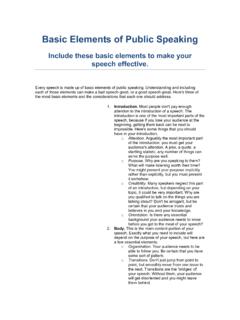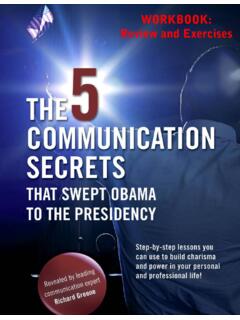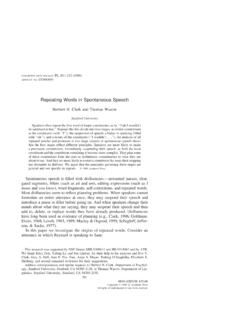Transcription of GUIDE FOR THE PUBLIC SPEAKING & DEBATING DIRECTOR
1 1 GUIDE FOR THEPUBLICSPEAKING & for for debatersMatter 40 pointsManner 40 pointsMethod 20 notes for for PUBLIC speakers6. Rules for PUBLIC Acknowledgments8. AppendixDebating scoresheetsPublic SPEAKING scoresheets It usually takes more than 3 weeks to prepare a good impromptu speech. Mark Twain (1835-1910) People generally quarrel because they cannot argue. Gilbert K. Chesterton3 Your Club List of adjudicators and their phone IntroductionDebating in Apex is designed to be enjoyable and at the same time develop the Apexiansability to express themselves in a debate, each speaker has a specific role to play, and it must be remembered thatdebating is a team effort involving argument, and not necessarily three good provides an important facet of leadership training in that:1.
2 It provides an opportunity to practice SPEAKING in PUBLIC ;2. Creates an interest to gain further knowledge (research of topic);3. Forces one to listen to the other mans point of view;4. Teaches one to recognize a weakness or weaknesses in an argument;5. Encourages sound thinking and to use logic;6. Teaches the operation and value of teamwork;7. Trains men and women to think whilst on their development of these attributes helps to mould our character, and assists us in playinga greater role in our communities as leaders and accepting leadership Rules for Apex Debating1. A debate is a contest between two teams of three speakers The first debater for the affirmative team speaks first, followed by a speaker from thenegative team, alternating until the final speaker , who is always from the negative The final speaker from the negative team may not introduce new material into Each speaker shall speak for five (5)
3 Minutes with a warning bell at four minutes and twobells at five To speak longer than the allotted time is unfair, and therefore adjudicators should ignorewhat is uttered after the five minute All competitions to use the official Apex DEBATING All competitions to have three adjudicators whose decision is Each adjudicator shall add up the Speakers marks to determine whom he thinks won thedebate. The winning team is decided by either a majority 2-1, or unanimous 3-0 the adjudicators total scores are not to be added together as this can produce anincorrect If a team fails to attend within fifteen minutes of the scheduled starting time of thedebate, then they are considered to have forfeited that debate.
4 (District Governor discretionmay be required in extenuating circumstances).10. All competitions to have an official time keeper who must inform the adjudicators howlong an individual spoke The official dictionary used in Apex debates is the Australian Concise Oxford With respect to Secondary School DEBATING , the competition is open to all studentsunder the age of eighteen years on the 30th of June in that particular Organizers should endeavour to present official certificates, with names already printedon them, to debaters on the Certificates and scoresheets are available from Supply Guidelines for DebatersGeneralWhat s the difference between DEBATING and PUBLIC SPEAKING ?Good question. A PUBLIC speaker may deliver a well prepared speech, may deal with asubject close to the speakers heart, and may have the speech well rehearsed.
5 A debater needs to prepare information and arguments, but cannot rehearse these. Thefinal configuration of his argument will depend on the arguments presented by his ownteam members and members of the opposition. A debater may also find himself DEBATING atopic he has little interest in, or find himself DEBATING for the side of the argument hepersonally disagrees , good debaters are able to think on their feet, divorce themselves from their ownbeliefs and construct a sincere argument regardless of the topic. This requires imaginationand in the form of co-ordination between the arguments of all debaters is desirableand should be apparent. In particular, the second and third speakers should presentarguments consistent with the interpretation of the subject presented by the first is exemplified by the manner in which debaters support, elaborate andemphasise each others arguments to strengthen their case, while destroying the argumentsof their opponentsAll debaters need to come to grips with the arguments of the opposition andrebut them whenever the event of a conflict upon a point of interpretation, subsequent speakers should notoverlook or ignore the conflict.
6 But seek to clarify their team s speaker after the first affirmative should not fail to deal with the arguments of thespeaker immediately preceding is a team event, and the better team always 40 pointsTalk sense. What you say must make be logical. Stick to your guns, be convincing and avoida hesitant presentation. It is better to deliver simple arguments that you understandyourself and can convey with confidence, than lofty, abstract arguments that have yougrasping for words and failing to convince your Sometimes in DEBATING , less is more. Many people fall into the trap ofwanting to avoid standing there with nothing to say. So they compile 20 minutes ofarguments to ensure safety ie.
7 That the bell will ring and they can sit down having overfilled five minutes. This inevitably results in the speaker failing to summarise his teamscase or doing it in a rushed fashion, and most importantly the speaker fails to rebut theopposition case. DEBATING is not about who can present the greatest number of reasons fortheir case. It is primarily about destroying the opposition argument and building your owncredible , encyclopaedia and personal quotations should receive appropriate butminimal use. Avoid statistics unless they are essential. Avoid reciting passages. Speak asyou would to a friend. Put what you have read and learned into your own Avoid beginning the debate with a dictionary definition of every word.
8 Defineonly what is essential for a reasonable listener to be able to understand your interpretationof the case. Some debates get bogged down in definition debates, or quibbling over themeaning of words, which is bad DEBATING , and certain to discourage the audience and futuredebaters. Definitions should not be used to excuse a debater from answering the opponent debate is a verbal fight. Each speaker except first affirmative must join issue with hisopponents demolishing their case while consolidating their vocabulary carefully. Some words are powerful and create an image the audiencewill be sympathetic to. Other words are wishy washy and put listeners to preparing your case, consider the other side.
9 Study counter arguments and preparerebuttal in advance. This will help you on the night and allow you more thinking time toconsider the unexpected arguments of the opposition and rebut those are best. Avoid the large sheet of paper it s too easy to get lost on a single page inthe thrust of a debate when you re gesturing and thumping the lectern. With cards, when indoubt where you re up to, simply turn over to the next card and maintain your it to one or two ideas in point form on a card. Don t write half your debate in tiny printon a single business in mind an average speaker speaks at a rate of 180 words a minute. Therefore if youhave 20 cards, each card should last fifteen seconds or about forty-five words which is thesame number in this paragraph.
10 Read it aloud and you take fifteen seconds? Excellent if you did. That s a comfortable listening rate foryour audience. If you took more than 20 seconds then you re too slow you re audience willbe anticipating your words before you say them and they will soon drift off to sleep. If youtook less than ten seconds, then you re a bit of a motor mouth. Your audience won t be ableto keep up, and you ll lose them after sixty seconds. Pace yourself, by using cards. They arean excellent original. Avoid cliches. Try and present arguments that will catch out your oppositionand when they fail to rebut them, reiterate them and remind them of their 40 pointsAppearance -relaxed stance, eye contact with audience, neat dress, gesture incontrolled fashion, poise, - The debater must be heard.










